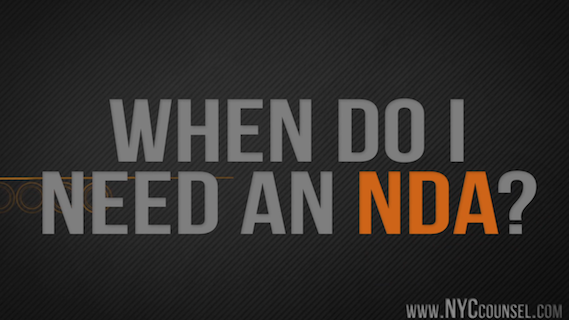There are plenty of reasons to have an NDA. I will limit this post to discussion of using an NDA between technology businesses in an arms-length transaction.
For more information, click to watch the video, “When do I need an NDA” 
More often than not, for whatever reason, whenever there is a technology related transaction at hand, the parties want to sign nondisclosure agreements right away. On the one hand, it is very advantageous to make sure your confidential information and trade secrets are secure. On the other hand, I don’t advise exchanging confidential information with strangers right away. Regardless of whether there is a signed NDA in place, it is best to keep your secrets to yourself until your interest in the opportunity at hand is piqued to the point where you believe the potential relationship might get serious.
Up until that point, a technology company can demonstrate its capabilities without necessarily disclosing the “secret sauce” of “how” it does it (note, if the capabilities are as much a secret as the “how” then this may not apply).
You should not sign a “form” NDA. Each NDA should be customized for the facts and opportunity at hand. You should call us (or another New York Business Lawyer or corporate attorney highly experienced in business and technology matters) to review, negotiate and revise any form NDA presented to you to sign.
A Nondisclosure Agreement is more than a commitment to keep your confidential information secret — you also don’t want the other party to use your confidential information for their own benefit. You want to protect your ideas with the NDA. As the old saying goes (absent a promise to keep a secret), “ideas are as free as the wind.” Copyrights can protect your “expressions” of an idea (like music, a novel, software code, or a photograph or painting, among other things); and a patent can protect your idea that is used to create a nonobvious and useful invention. But an idea is free to copy — so you need to protect it as a secret. This means that other party should never be able to use your idea freely; a well drafted NDA should limit the purposes for which the confidential information may be used.
Trade Secrets. A trade secret is an idea that derives independent economic value from not being generally known to the public or readily ascertainable by proper means by third parties who could obtain economic value from its disclosure. You can’t just say that some information about your business is a trade secret. You have to take efforts to keep it secret (like keeping the formula to Coke in a safe and having employees sign NDA’s). You should also take care in the NDA to distinguish the treatment of confidential information and trade secrets. This is important because most NDAs have an expiration date after which a party is free to reveal the confidential information (e.g., either an express term or a certain period of time following the date of disclosure). You never want an expiration date with respect to the obligation of keeping a trade secret confidential. You also never want to have too long of a term to keep regular confidential information secret (especially in the world of technology where the information could be obsolete in a couple of years).
Having said this, if you’re revealing a trade secret, which you should do in the rarest of occasions, the obligation to maintain the secret should be an absolute must, and in all events, last forever. This is because once an obligation to maintain the information confidential is gone, then it no longer can be deemed a trade secret (the toothpaste is out of the tube and cannot be put back). Courts will not protect your right in that trade secret after you’ve consented to it being publicly revealed.


